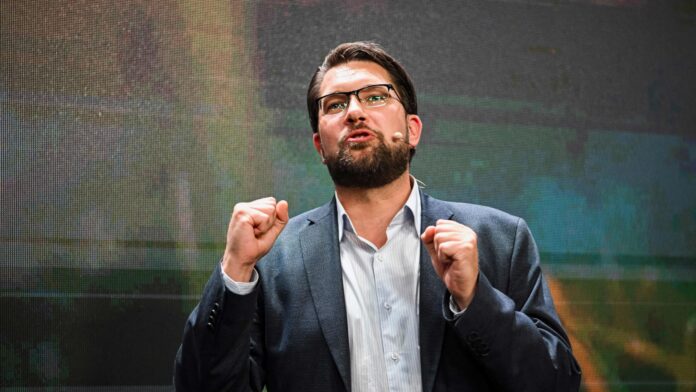Andersson became Sweden’s first-ever female prime minister last year and has led the country’s historic bid to join NATO following Russia’s onslaught in Ukraine.
Jessica Gow | Afp | Getty Images
Swedish Prime Minister Magdalena Andersson has conceded defeat in the country’s close-fought election, paving the way for the far-right Sweden Democrats and allied parties to attempt to form a government.
The center-left Social Democrats, led by Andersson, received 30.3% of the vote, reaffirming its position as the country’s largest party with almost all the votes counted.
However, the left-of-center parties — the Social Democrats, along with three others — failed to achieve a majority in Sweden’s 349-seat parliament, or Riksdag.
Instead, a right-wing group of parties, led by Ulf Kristersson’s center-right Moderates, looks to have won a narrow majority of seats, and will have the first go at forming an administration.
This so-called “blue bloc” includes the anti-immigration Sweden Democrats. The party, once shunned by the political establishment, recorded its best election result yet with 20.5% of the vote.
It represents a historic turning point in Swedish politics.
The Sweden Democrats now stand on the cusp of gaining influence over government policy. The nationalist party campaigned on law-and-order issues following a rise in gun violence and has vowed to bring in longer prison sentences and reduce immigration.
Sweden, a Scandinavian country of roughly 10.5 million, has a reputation for being one of Europe’s most progressive states and consistently ranks among the happiest nations in the world.
Andersson concerned for the years ahead
Speaking at a news conference on Wednesday, Andersson announced her intention to resign and said the right-wing bloc of parties had a one or two seat advantage. “It is a thin majority, but it is a majority.”
“Most opinion polls showed us that it would be a close race in the election, so I was not surprised that it went this way rather than the other way,” Andersson said. “I knew that could happen but of course I am concerned with how the development will be in the coming years.”
Andersson became Sweden’s first-ever female prime minister last year and has led the country’s historic bid to join NATO following Russia’s onslaught in Ukraine.
She has criticized the rising popularity of the Sweden Democrats, warning that having such a party in government could have significant repercussions on the tone of political debate.
Jimmie Akesson, leader of the Sweden Democrats, said his party would be a “constructive and driving force” in rebuilding safety in the country, Sky News reported. He added that it was “time to put Sweden first.”
Sweden has a reputation for being one of Europe’s most progressive states and consistently ranks among the happiest nations in the world.
Jonathan Nackstrand | Afp | Getty Images
The Sweden Democrats emerged from the country’s neo-Nazi movement in the late 1980s and have since struggled to distance themselves from accusations of extremism. The party won representation in the Riksdag for the first time in 2010.
A gradual increase in national support thereafter prompted the center-right Moderate party to embrace cooperation with the Sweden Democrats in 2018. Kristersson’s Moderates had previously ruled out negotiating with the right-wing party.
Kristersson said on Wednesday that he would start the work of forming a new government “that can get things done,” Reuters reported.
Complicating the picture somewhat, however, is the fact that the Liberals and Sweden Democrats — both part of the right-wing bloc — refuse to serve together in government.
‘A very unstable coalition’
“I do think that in the end there will be some form of representation from the Sweden Democrats in the government, but this will lead to a very unstable coalition,” Anamaria Dutceac Segesten, senior lecturer in European Studies at Lund University in Sweden, told CNBC via telephone.
Even if this is not through the means of a ministerial position, Dutceac Segesten said the Sweden Democrats were likely to influence the agenda of a future government led by the Moderates’ Kristersson.
“It is always complicated,” she added. “In 2018, it took three months to have a Swedish government. Only in December did we actually have a proper coalition, and it was an unstable coalition — one that had a vote of no confidence twice and a change of prime minister.”
Dutceac Segesten said a shaky start for the previous administration was likely a sign of things to come for the formation of a new government.
Jimmie Akesson, leader of the Sweden Democrats, reportedly said his party would be a “constructive and driving force” in rebuilding safety in the country.
Jonathan Nackstrand | Afp | Getty Images
Prianthi Roy, analyst at the Economist Intelligence Unit, a research and advisory firm, told CNBC that the most likely outcome from the election was a center-right government led by the Moderates in coalition with the Christian Democrats and the Liberals.
“The Sweden Democrats, now the second-largest party in the parliament, will probably remain outside government but will support the coalition in parliament in return for policy concessions, including tighter asylum regulations,” Roy said via email.


